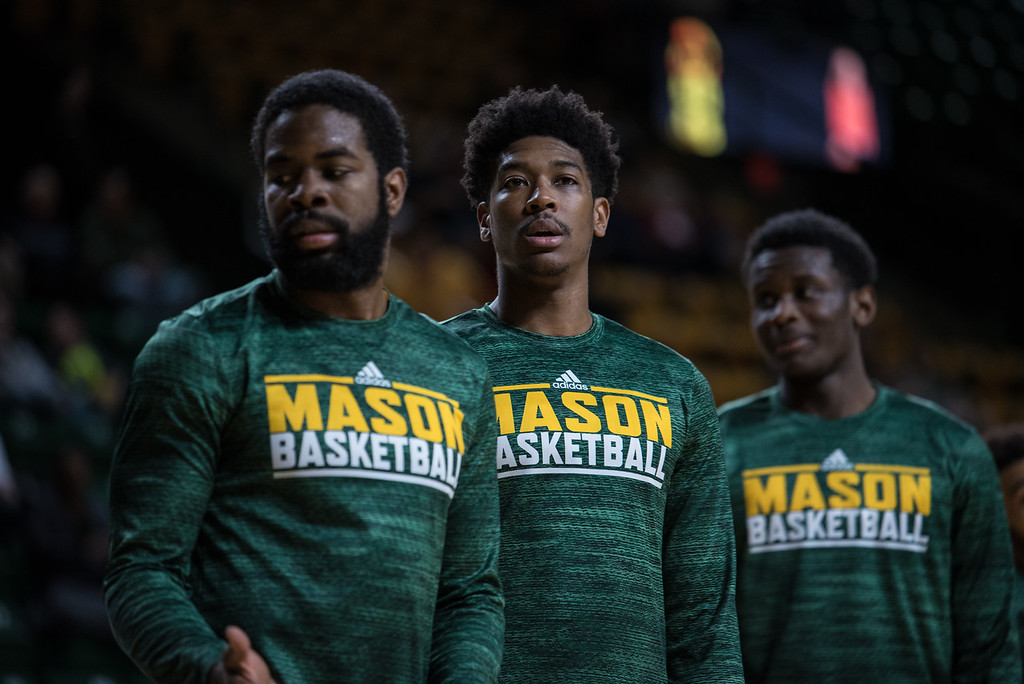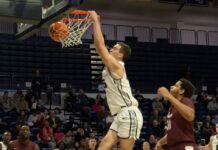Welcome back to the George Mason basketball weekly rundown! It’s too bad there’s nothing cool to talk about this week. Let’s jump right in.
What are the odds of the same player hitting a true buzzer beater for the win in consecutive games?
Regarding Ian Boyd’s consecutive buzzer beaters, I think there are a couple things that make them less likely and a couple things that make them more likely (relatively to the very small likelihood of hitting a buzzer beater in the first place). First in the less likely column, Ian is fifth on the team in points and field goal attempts per game. If you had to guess which player was going to win consecutive games at the buzzer, you definitely would have started with Otis Livingston, then you would have guessed Jaire Grayer, Justin Kier or Goanar Mar in some order just because they shoot and score more than Boyd does. Second, these were true buzzer beaters, meaning the clock was at zero after both shots went in. The term “buzzer beater” is often conflated with shots that go in with a second or two still on the clock, but that wasn’t the case for either of these. Third, both shots gave Mason the win. Plenty of last-second shots send games to overtime instead of winning the game outright.
The only thing I can think of that puts these in the “more likely” column is that both shots were from a reasonable distance. St. Joe’s was slain with a three from the top of the key, and UMass on a layup at the rim. These weren’t halfcourt heaves, and they weren’t even contested particularly well given the circumstances.
As to the odds of even hitting one buzzer beater, I have no idea. I can’t find anything on kenpom or basketball reference on the subject. Googling terms like “buzzer beater odds” or “buzzer beater research” returns a lot of articles about individual buzzer beaters, but no broader context about the odds of hitting one in the first place. There are a few reddit threads dedicated to NBA buzzer beaters, but those aren’t really translatable to college because NBA players are much better shooters and the NBA has some rule quirks that make them more likely. If you’ve come across a good piece of research on the likelihood of buzzer beaters, send it my way. On second thought, numerically quantifying the odds might wash away the magic. Keep that research to yourself and let Uncle Nate keep doing his thing.
PS: the “We are heading to… OH NO!” call from the St. Joe’s announcer is one of the funniest things I’ve ever heard. GiantKiller has a fantastic OH NO button you can use to harass your Hawk Hill friends.
Defensive rating on the rise
It might not feel like it, but Mason’s defense is getting markedly better. I promise! We can prove this out using defensive rating, which is points per possession multiplied by 100, or how many points a team would theoretically allow in a game with 100 possessions. At the game level your defensive rating is simply your opponents’ offensive rating, so I use the terms interchangeably here.
In the first nine games of conference play, Mason held only one opponent (at UMass) under an offensive rating of 100. The second best defensive performance of that stretch was allowing an O rating of 108 in the double overtime loss to Duquesne. Mason had a defensive rating of 112 or worse in the other seven games to open conference play, going 3-6.
Things turned around after St. Bonaventure lit Eagle Bank Arena on fire with an offensive rating of 119.7. In the six games after, Mason had a defensive rating under 100, with St. Joe’s 98.7 the highest and Dayton’s 90.5 the lowest. Mason had a defensive rating of 102.7 in Saturday’s game against UMass, which was the worst since that Bonaventure game. That’s a tremendous turnaround and a big part of the reason Mason is 5-2 in the last 7.
Is the small lineup an issue?
Now that we’ve talked about the fun stuff, let’s address the elephant in the room. Mason has blown gigantic leads in three consecutive games, and I’ve griped on twitter that I think it’s partially related to going small down the stretch. Paulsen has taken Calixte and AJ off the floor, which leaves Goanar to defend the post, with about four to six minutes left in the past several games. This lineup has a lot of trouble getting stops and keeping the opponent off the boards. Let’s look at the score, minute mark, and what happened after we went small down the stretch for the last three games:
UMass: AJ Wilson checked out at 4:16 with Mason leading 55-53. Mason was outscored 11-6 down the stretch until Goanar Mar hit three clutch free throws with one second left to send the game to overtime. Greg and AJ didn’t play in the overtime period in which Mason outscored UMass 14-12. Final result: small lineup drew at 25-25.
St. Joe’s: Greg Calixte subbed out at 5:44 with Mason leading 59-51. Mason would push the lead up to 13 before letting St. Joe’s tie it at the end and giving Boyd his first sweet buzzer beater. Mason won 79-76. Final result: small lineup was outscored 25-20.
La Salle: Greg Calixte subbed out at 6:49 with Mason trailing 55-54. La Salle won 69-62. Final result: small lineup was outscored 14-8.
Add these together and the small lineup was outscored by a margin of 64-53 over about 22 minutes of game time. That’s not good, but I admit I expected these splits to be worse. The first thing that jumps out here is that my hand-wringing over the small lineup might be misplaced; by the time Mason went small, the lead had already been blown. Mason was up 16 against UMass, 20 against St. Joe’s, and 16 against La Salle. You can see from the game situations listed those leads were all but evaporated when the bigs checked out. Any confidence that a bigger lineup could do better when it was a big part of the lead disappearing seems unfounded. In any case, I would like to see Mason try some offense/defense substitutions so that a big body like Calixte can patrol the paint. CJ Anderson from UMass scored the tying bucket at the rim, Shavar Newkirk from St. Joe’s was fouled in the paint to tie, and Tony Washington from La Salle had his way at the rim.
The coaching staff chalks up the blown leads issue to experience and maturity. It’s tough to disagree. UMass is a last-place team that was missing their best player, and three of the seven guys who played for them were walk-ons. Tactics are probably secondary to focus and intensity when trying to hold a lead in that situation.
Mason career blocks
According to the Mason career record book, Jai Lewis and Jalen Jenkins are tied for 9th place in Mason history with 91 career blocks. There’s a very real chance that Jaire Grayer and AJ Wilson get in the top ten before their careers are over.
Jaire is sitting on 70 career blocks. He was averaging 1.5 blocks per game this season up until the St. Louis game when his mysterious foot injury appeared. He’s got 4 blocks in the 11 games since then. He’s already well within striking distance of the top ten, but if he gets back into form and adds a few more before the end of the season he’ll have top ten all but locked up heading into next year.
AJ Wilson is an interesting case. The freshman has 33 blocks already this season despite playing 11.7 minutes per game. He has a tendency to take himself out of rebounding position when he’s chasing blocks, which I’m sure drives Paulsen crazy and limits his minutes. He’s also been limited with foul trouble in several games. If he can get into the 20+ minutes per game range as a sophomore he’s a legitimate threat to average 2+ blocks per game. His 11.6% block rate would be 17th in the country, according to KenPom, but he hasn’t played the 40% of available minutes needed to qualify.
End the season strong
Mason has an opportunity to finish as the four seed in the conference tournament, which is important because the top four seeds get a double-bye. All roads to the four seed include Mason winning out and St. Louis dropping at least one of their remaining two games, and even then it might not happen. The odds Mason gets the four seed are small, but the fact that we’re even talking about it is a small miracle. Here’s a very quick breakdown:
St. Louis: 9-7 in conference, clinches the four seed by winning out. Last two games are at Duquesne and home against St. Bonaventure. 2-0 or 0-2 are both very possible finishes. Mason owns the tie-breaker here by virtue of the head-to-head win in their only meeting, so if Mason and SLU finish 10-8 Mason would have the better seed.
VCU: tied with Mason at 8-8 in conference, which makes Wednesday night’s tilt incredibly important. They close their season at Fordham, so they’re unlikely to end the season any worse than 9-9.
St. Joe’s: Also 8-8 in conference, but they go to Rhode Island before closing the season at home against La Salle. You can pencil them in for 9-9.
Mason: 8-8 in conference, goes to VCU on Wednesday and ends the regular season home against a reeling Richmond team on Saturday. 10-8, 9-9, 8-10 all very much in play.
Think of the race for the four seed as a race to ten conference wins, with some tiebreaker caveats. Although it gets messier, because there is a scenario where six teams end the season 9-9 and tied for fourth place. We’ll cross that bridge when we come to it.
That’s it for this week. Go Mason!











I9BET duoc menh danh la mot trong nhung san choi cung cap cac dich vu giai tri chuyen nghiep va uy tin. Tham gia tai i9bet, cong dong game thu se duoc trai nghiem mot khong gian giai tri dat chuan dang cap quoc te. Hon the nua nguoi choi co the vua giai tri vua co the san thuong cuc lon tai day.
Website: https://i9bet-vn.net/